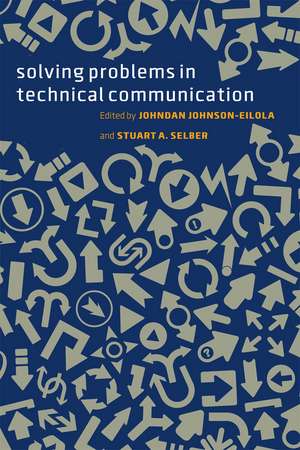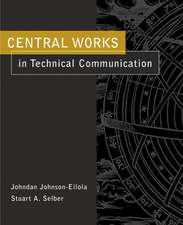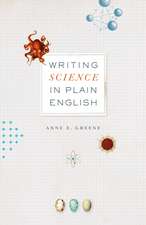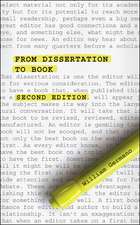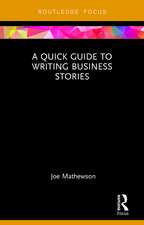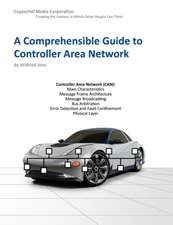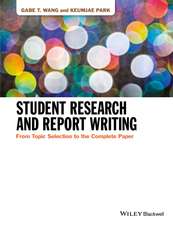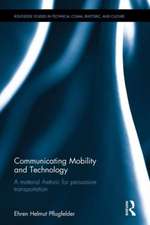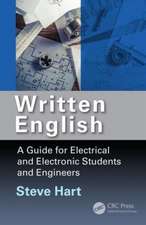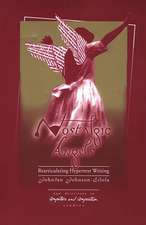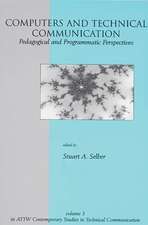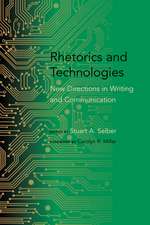Solving Problems in Technical Communication
Editat de Johndan Johnson-Eilola, Stuart A. Selberen Limba Engleză Paperback – 4 ian 2013
Solving Problems in Technical Communication collects the latest research and theory in the field and applies it to real-world problems faced by practitioners—problems involving ethics, intercultural communication, new media, and other areas that determine the boundaries of the discipline. The book is structured in four parts, offering an overview of the field, situating it historically and culturally, reviewing various theoretical approaches to technical communication, and examining how the field can be advanced by drawing on diverse perspectives. Timely, informed, and practical, Solving Problems in Technical Communication will be an essential tool for undergraduates and graduate students as they begin the transition from classroom to career.
Preț: 396.48 lei
Nou
Puncte Express: 595
Preț estimativ în valută:
75.86€ • 79.42$ • 62.77£
75.86€ • 79.42$ • 62.77£
Carte tipărită la comandă
Livrare economică 05-19 aprilie
Preluare comenzi: 021 569.72.76
Specificații
ISBN-13: 9780226924076
ISBN-10: 0226924076
Pagini: 536
Ilustrații: 51 line drawings, 9 tables
Dimensiuni: 152 x 229 x 46 mm
Greutate: 0.7 kg
Ediția:New.
Editura: University of Chicago Press
Colecția University of Chicago Press
ISBN-10: 0226924076
Pagini: 536
Ilustrații: 51 line drawings, 9 tables
Dimensiuni: 152 x 229 x 46 mm
Greutate: 0.7 kg
Ediția:New.
Editura: University of Chicago Press
Colecția University of Chicago Press
Notă biografică
Johndan Johnson-Eilolais professor of communication and media at Clarkson University. He is the author of Datacloud, coauthor of Writing New Media, and coeditor, with Stuart A. Selber, of Central Works in Technical Communication. Stuart A. Selber is associate professor of English at Penn State. He is the author of Multiliteracies for a Digital Age and the editor of Rhetorics and Technologies and Computers and Technical Communication.
Cuprins
Introduction
Johndan Johnson-Eilola and Stuart A. Selber
Johndan Johnson-Eilola and Stuart A. Selber
Part 1: Mapping the Field
1 What Are the Boundaries, Artifacts, and Identities of Technical Communication?
Richard J. Selfe and Cynthia L. Selfe
2 What Are the Work Patterns of Technical Communication?
William Hart-Davidson
3 How Can Technical Communicators Fit into Contemporary Organizations?
Jim Henry
4 How Can Technical Communicators Develop as Both Students and Professionals?
Kelli Cargile Cook, Emily Cook, Ben Minson, and Stephanie Wilson
Part 2: Situating the Field
5 How Can Rhetoric Theory Inform the Practice of Technical Communication?
James E. Porter
6 How Can Work Tools Shape and Organize Technical Communication?
Jason Swarts
7 What Can History Teach Us about Technical Communication?
Bernadette Longo and T. Kenny Fountain
8 What Is the Future of Technical Communication?
Brad Mehlenbacher
Part 3: Understanding Field Approaches
9 How Can Technical Communicators Work in an Ethical and Legal Manner?
J. Blake Scott
10 How Can Technical Communicators Plan for Users?
Antonio Ceraso
11 How Can Technical Communicators Study Work Contexts?
Clay Spinuzzi
12 How Can Technical Communicators Evaluate the Usability of Artifacts?
Barbara Mirel
13 How Can Technical Communicators Manage Projects?
R. Stanley Dicks
Part 4: Developing Field Knowledge
14 What Do Technical Communicators Need to Know about Genre?
Brent Henze
15 What Do Technical Communicators Need to Know about Writing?
Ann M. Blakeslee and Gerald J. Savage
16 What Do Technical Communicators Need to Know about Information Design?
Karen Schriver
17 What Do Technical Communicators Need to Know about New Media?
Anne Frances Wysocki
18 What Do Technical Communicators Need to Know about Collaboration?
Rebecca E. Burnett, L. Andrew Cooper, and Candice A. Welhausen
19 What Do Technical Communicators Need to Know about International Environments?
Kirk St. Amant
List of Contributors
Index
Recenzii
"Using heuristics at both a macrolevel and a microlevel, the editors offer a robust framework for investigating, engaging, and resolving
workplace situations that technical communicators often encounter. . . . Solving Problems is an ideal book for students in upper level undergraduate or graduate courses in technical communication. Yet, with its insightful chapters detailing professional development, new media, and visual rhetoric, the book is also valuable to experienced technical communicators, who will find content that is applicable in today’s competitive, mediainfluenced workplace."
workplace situations that technical communicators often encounter. . . . Solving Problems is an ideal book for students in upper level undergraduate or graduate courses in technical communication. Yet, with its insightful chapters detailing professional development, new media, and visual rhetoric, the book is also valuable to experienced technical communicators, who will find content that is applicable in today’s competitive, mediainfluenced workplace."
"In Solving Problems, leading scholars explain how their areas of expertise contribute to technical communication. In assembling these scholars, Johnson-Eilola and Selber offer a collection that introduces readers to 19 areas of content relevant to the discipline, including new media, international environments, and information design. . . . The editors and contributors show readers how their technical communication education will influence the workplace and vice versa. To that end, they help readers see that education does not end with a degree; the workplace will be a learning experience for readers, and readers must adapt as needed."
"An accessible introduction to major topics in the theory and practice of technical communication."
“Solving Problems in Technical Communication is excellent, sound, and credible. Every chapter is engaging, easy to follow, and accurate, which doesn’t surprise me given the editors and contributors—all are distinguished leaders with long vitas chronicling the major conversations in the field.”
"Provides a richer theoretical approach to technical communication. Such a collection is long overdue."
Winner
